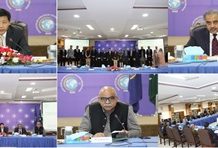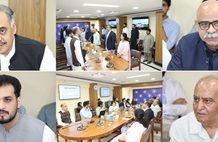Looking at the history of many of the figures that occupy cabinet and other high positions in the government, anyone serious about political business would hardly consider them stable political allies
Last week, while addressing the parliamentary party of the Muslim League and its allies, General Musharraf complained that members of the ruling coalition were not around when he needed them the most to defend his agenda and his policies in the media and before the people. He was alone in presenting his Afghanistan policy and aligning with the United States in the war on terror, and in arguing that what he did was in the national interest.
The apathy of General Musharraf’s political partners was evident well before the judicial crisis overtook every other political matter. General Musharraf has stated an obvious political fact about his relationship with the political groups that he has put together to maintain an appearance of elected, democratic government.
His frustration with the party crowd, and beneath it some anger, is genuine. He thinks he has done for them nearly everything that in Pakistan is associated with power and privilege, with no questions asked. One thing that a party leader or a general in power might expect from the political coalition of the willing in turn for placing them in power is unwavering political loyalty. But this is something that is in short supply, temporary, and largely influenced by political expediency and immediate interests.
Looking at the history of many of the figures that occupy cabinet and other high positions in the government, anyone serious about political business would hardly consider them stable political allies. Barring freshmen in politics, most of the others have changed parties, principles, patrons and political affiliations at an average of three to four times.
The class of parliamentarians that dominates the Muslim League Q are seasoned players of our power-oriented political game. They have seen many governments come and go during their political careers. They are pragmatic types, political realists to the core and very keen to defend what they believe is their turf and self-interest in the anarchic world of Pakistani politics. In this stream of politics, they have acquired remarkable skills of political survival because they can read coming storms and tidal waves on the political weather maps better than the men in uniform.
General Musharraf should not be surprised, even if he has discovered it at this late hour, that the men and women in his political crowd are the flexible kind and can shift from one side of the political spectrum to another without any moral compunction.
I am not sure if the alliance between the Muslim League Q and General Musharraf was born out of any conviction about his agenda of “enlightened moderation” or of helping the country make the transition to democracy. Both needed each other’s support, the General to have a political fig leaf and the crowd to occupy the treasury benches.
This has been our political history for the larger part of our existence. Politics without principles has gradually developed into our cultural norm, and not an exception. But the marriages of conveniences in politics last as long as the political voyage is trouble-free and the big ship does not encounter rough weather. Therefore, one of the important reasons for Musharraf’s political crowd melting away is its assessment that he may not be around in power for too long.
Political opportunism among our ruling class is not the only reason for many of its members wanting to desert or sit on the fence in the ongoing confrontation between the government and the opposition parties and civil society groups. They have some good reasons to be offended with some of Musharraf’s decisions that cannot be defended publicly; and if they do defend them, they will incur a huge political cost.
No matter how flawed our electoral process might be, members of the national and provincial assemblies face equally ambitious competitors and seek votes from the masses. Maintaining a degree of popularity, credibility and service to the communities they represent is essential to their electoral prospects. It is quite rational that their political choices and behaviour be shaped by purely political considerations. The interests of the majority of them do not fit into the command and control hierarchy of the military.
Obviously they would like to register dissent, as some of them have done in the closed meetings of the party, and to chart their own course in politics at the first opportunity if the government of which they are part sets itself on a self-destructive path. The sacking of the chief justice and his treatment by the Musharraf government is a case in point. Also, murders of political workers of the opposition parties in Karachi by the MQM, closely allied to the president, sent shockwaves through the entire body politic of Pakistan. Many members of the ruling coalition were perhaps as grieved as civil society and opposition parties.
These two acts have washed off all the good work that Musharraf has done in reviving the economy and freeing the media in the country. While trying to recapture the political initiative and get a better handle on political matters, the government opened up another front by attempting to gag the media, harass journalists and allowing thugs of allied groups to attack private television channels. No one with a clean conscience or wanting to contest general elections would stand up in public and argue that mistreating the chief justice of Pakistan, murdering political workers and silencing media are in the national interest. Only a person with a tunnel vision and one quite oblivious to the long-term national interest in civility, democratic governance and national harmony would defend every action of the government blindly.
In explaining the displeasure and dissent of the members of the ruling group we should not ignore the decision-making process of the present regime, which is highly centralised and quite often out of the domain of political allies. The unhappy members of the ruling groups are right in complaining that they were not consulted on any of the three issues we have briefly mentioned. One of the important features of democratic governments is that decision-making in the ruling parties or coalitions is participatory. This has tremendous significance for keeping everybody on board. Collective decision-making, which takes into account individuals’ and groups’ political stakes, is qualitatively better in anticipating possible political fallout and forcing various actors to compromise and be moderate. I do not think the decision-making style of Musharraf has any of these virtues.
The result is that he and his cohort of non-elected advisers have become isolated, out of touch with political reality, and find their ranks of enthusiastic supporters in the public arena dwindling.
The author is a professor of Political Science at the Lahore University of Management Sciences.













